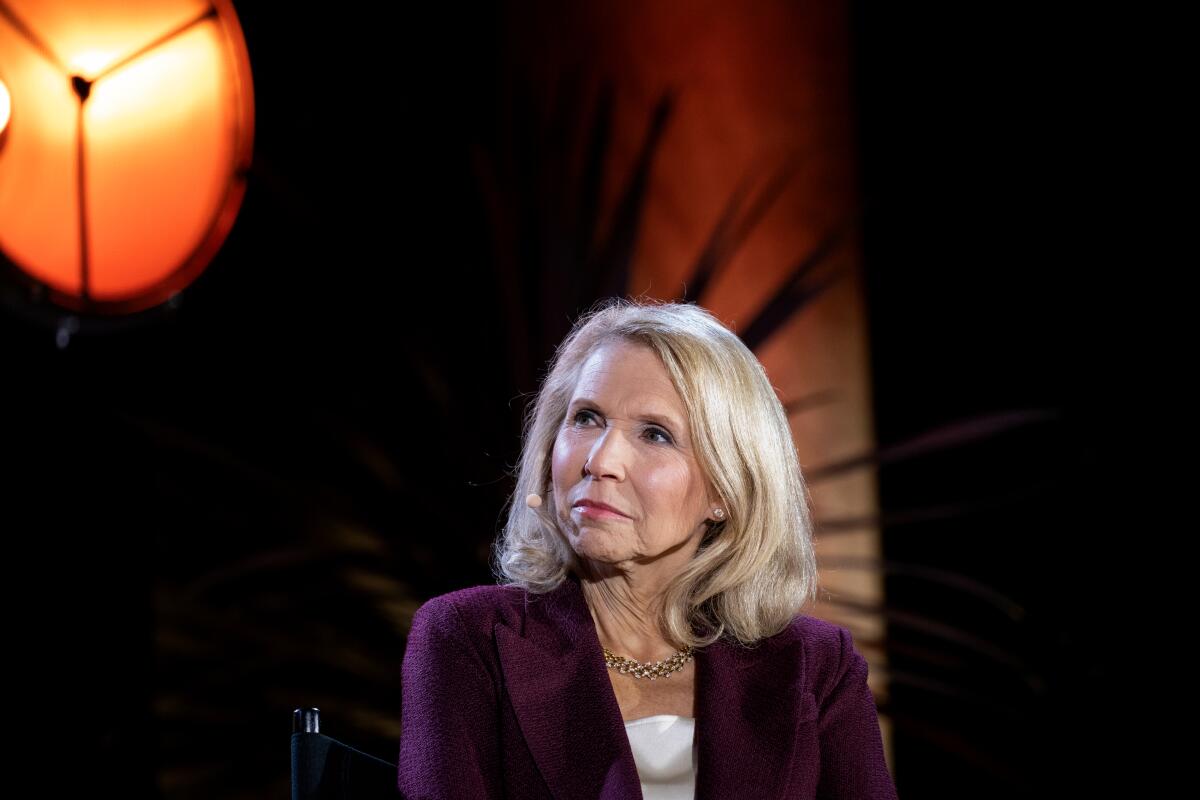“We are on the ascent … reaching for new heights,” Redstone, Paramount’s controlling shareholder and non-executive chairperson, confidently told investors in February 2022 during a virtual event from a soundstage in Queens, N.Y.
Rather than leading Paramount to reclaim its place among industry titans, Redstone’s tenure atop the company has been marred by miscalculations and setbacks. She’s trying to sell the company known for its fabled film studio, the venerable CBS broadcast network, TV stations and cable channels.
But Redstone’s willingness to hand Paramount to tech scion David Ellison in a complicated two-phase transaction has infuriated investors, caused months of tensions in the boardroom and contributed to the ouster of Chief Executive Bob Bakish, according to knowledgeable people who were not authorized to speak publicly.
Now the sale could be derailed.
“In 41 years of being in business, I’ve never seen a scenario quite like this,” said John W. Rogers Jr., founder and chairman of Ariel Investments, one of Paramount’s largest shareholders, in an interview.
How did Redstone and Paramount get into such a jam?
“It’s just been one terrible decision after another,” said corporate governance expert Nell Minow.
Years of under-investment, mismanagement, a titanic shift in audience behavior, a shotgun marriage of Viacom and CBS five years ago, the COVID-19 pandemic and a costly push into streaming have diminished the standing of the once-formidable Hollywood player, according to interviews with media industry executives, company insiders and financial experts.
Paramount’s stock has plunged 60% since Redstone’s upbeat assessment in early 2022. (Shares closed at $13.05 on Friday, virtually unchanged.) Shareholders have bolted, including legendary investor Warren Buffett, who this month acknowledged that buying Paramount stock (63 million shares) was a mistake, saying: “We lost quite a bit of money.”
Four Paramount board members are exiting next month. And with Bakish out, three top creative executives are running Paramount in an awkward “Office of the CEO” power-sharing arrangement that is likely a stop-gap until the company is sold.
Adding to the uncertainty: the 30-day exclusive negotiating period with Ellison’s Skydance Media and its partners, Redbird Capital Partners and KKR, expired earlier this month without a deal, despite a last-minute sweetener.
Now, Paramount’s independent board members are considering a $26-billion offer — nearly half of that in cash — from rival suitors Apollo Global Management and Sony Pictures Entertainment, which would take the majority stake of the proposed venture.
The Sony-Apollo bid also is controversial. It would face regulatory hurdles, including foreign ownership rules that likely prevent Sony from owning CBS and its stations, that could drag out the process for months. Should the bid succeed, analysts anticipate the company would then be carved up.
The film studio probably would be absorbed by Sony’s Culver City operations, rolling the ending credits for the Melrose Avenue fortress famous for such iconic films as “The Godfather,” “Terms of Endearment” and “Top Gun.” Massive layoffs surely would follow. And cable TV channels such as Nickelodeon and MTV could be jettisoned.
That deal also could crumble; Sony and Apollo want to study Paramount’s financial picture before going forward.
Redstone, who declined to comment for this story, is said to be open to other combinations that would drive shareholder value.
But she has wanted Paramount to remain a stand-alone enterprise and is fighting to preserve the legacy of her family and her late father, Sumner Redstone.
It might be too late. Despite enormous sway through her family’s ownership of 77% of Paramount’s voting shares, Redstone’s hand has been weakened by events, most of which were beyond her control.

(Al Seib / Los Angeles Times)
The road to the sale was paved by years of Redstone family dysfunction and an increasingly challenging landscape for traditional media companies.
Paramount, like Viacom before it, has long relied on its hugely profitable cable channels filled with inexpensive fare. Think “The Osbournes,” “Jersey Shore,” and “Tosh.0.” A decade ago, its cable channels operated with profit margins around 40%, but the shift to streaming has decimated that business, according to a knowledgeable executive not authorized to comment.
Most young adults no longer watch MTV or Comedy Central. They click on Netflix, which has transformed the business, helped in part by Viacom. A decade ago, Viacom executives eagerly licensed their shows, including Nickelodeon cartoons, which helped the streamer get established with consumers — and eventually devour their own business.
As the industry shifted, Viacom’s former chief prioritized stock buybacks instead of investing in content, longtime executives said.
Complicating matters, Sumner Redstone’s health was in a precipitous decline, and he was tussling with his daughter.
Shari Redstone was convinced that Viacom was being mismanaged. But her attempts to gain a bigger role in her father’s life or at Viacom were repeatedly rebuffed by the mercurial mogul, his live-in girlfriends and even Viacom’s top brass.
In 2014, Sumner Redstone offered his daughter $1 billion for her then-20% stake in the family’s Massachusetts-based holding company, National Amusements Inc., which holds the voting stock in the public entertainment company. But the deal hinged on her relinquishing her right to succeed him as chairman of Viacom and CBS Corp., which were then separate companies. She refused.
“Your grandfather said that I’ll be chair over his dead body,” Shari Redstone fumed in a July 2015 email to her youngest son.
The episode echoed a skirmish in 2007, when the elder Redstone faxed a letter to Forbes magazine to publicly vent his frustrations with his daughter and her ambitions: “While my daughter talks of good governance, she apparently ignores the cardinal rule of good governance that the boards of the two public companies, Viacom and CBS, should select my successor.”
He ended the letter with a humiliating barb, saying that while he gave stock to his daughter and son, “It is I, with little or no contribution on their part, who built these great media companies with the help of the boards.”

Sumner Redstone, right, with members of the USC marching band at the 2013 dedication of the Sumner Redstone Production Studios at USC’s film school.
(Lawrence K. Ho / Los Angeles Times)
Despite the barbs, Shari Redstone worked in lock-step with her father during the 2008 financial crisis, when his investments soured, nearly imperiling National Amusements. And she came to his rescue in late 2015 after he expelled his girlfriends from his Beverly Park mansion.
Sumner Redstone’s life was in tatters; then 93, he was losing mental capacity. In court documents in 2016, he acknowledged that he had lavished homes and gifts on two female companions worth more than $150 million.
The situation was so dire that the billionaire had to borrow $100 million from National Amusements to cover tax obligations for the gifts.
He died in August 2020. In recent court filings, Shari Redstone and another co-executor of the tycoon’s trust said they were prepared to settle his personal estate, which consisted of $2.9 million in cash, his coin collection, cemetery plots near Boston and 305 shares of Hanover Insurance Group common stock.
The family’s wealth has long been tied to its Paramount shares. And huge federal tax obligations are looming.
Ownership of the Paramount shares was transferred to Shari Redstone upon her father’s death, creating tax liabilities that exceed $200 million, knowledgeable people have said. Modest payments must be made each year until the bill reportedly comes due in 2034, according to one person familiar with the matter who was not authorized to speak publicly.
Another incentive to sell Paramount: The family’s debt-laden National Amusements has been strapped for cash. National Amusements runs a regional chain in the Northeast of movie multiplexes, an expansion of the business started by Sumner Redstone’s father, Mickey, in the 1930s. Like other theater owners, it has been walloped by COVID-19 pandemic closures and a slow-to-recover studio release schedule.
Last year’s strikes by Hollywood writers and actors exacerbated delays in movie releases.
Paramount, the smallest of the major media companies, posted a $417-million loss in the first quarter and has $14 billion in debt. It also faces an upcoming deadline to renegotiate a pivotal TV channels distribution deal with Charter Communications.
Last May, Paramount slashed dividend payments to shareholders in an effort to improve cash flow and attract new investors, but the move backfired, causing the stock to crater.
The dividend cut devastated National Amusements. Under pressure to meet its debt obligations, NAI last May accepted a $125-million equity investment from Chicago banker Byron Trott of BDT Capital Partners, an affiliate of his merchant bank, BDT & MSD Partners, which works with high-net-worth families. Trott has been advising Redstone on the sale.
Some shareholders privately grumble that Redstone is selling Paramount at a low because of NAI’s financial woes. However, others argue that it’s time to exit because the business is under such strain.
Beyond industrywide challenges, Paramount’s troubles have been deepened by leadership problems, with Bakish drawing particular scrutiny, insiders say.
Bakish was Shari Redstone’s choice to run Viacom in 2016, after a calamitous period marked by lawsuits and a purge of top managers and board members aligned with her father.
The 20-year Viacom veteran had been running its international TV business, selling its programming, including “SpongeBob SquarePants,” overseas. Redstone touted Bakish’s people skills and his business acumen.

“SpongeBob SquarePants” has been a hit for Paramount’s Nickelodeon.
(Nickelodeon)
Then, Redstone’s goal was to quickly merge Viacom with CBS, but she faced resistance from CBS’ then-chief Leslie Moonves, who felt the merger would be a disaster that saddled the stronger CBS with Viacom’s weaker assets. It wasn’t until a year after Moonves departed amid resurfaced allegations of sexual misconduct that Redstone achieved her goal of uniting the two halves of her father’s empire.
Three months later, the pandemic hit.
Viewers’ migration to streaming accelerated, prompting Paramount and other media companies to double down on building their own streaming platforms. Former Paramount executives questioned the logic, noting that Viacom’s TV arsenal was largely made up of inexpensive reality fare, kids shows and topical programming such as Comedy Central’s “The Daily Show” — not the type of prestige dramas that cost $15 million an episode.
Paramount had a surprise hit in Taylor Sheridan’s western drama “Yellowstone” for cable’s Paramount Network, so it spent wildly to churn out pricy prequels in the Sheridan universe. And “Yellowstone” streams on NBCUniversal’s Peacock.
Paramount has lost more than $3 billion on its push into streaming since early 2022, filings show.
Last year, Comcast Corp. executives had conversations with Bakish about joining forces in streaming, three people close to the situation said. They discussed uniting their two streaming services, Peacock and Paramount+, to better compete against Disney+ and Netflix. But Comcast wanted controlling interest and the talks stalled.
Newsletter
Subscriber Exclusive Alert
If you’re an L.A. Times subscriber, you can sign up to get alerts about early or entirely exclusive content.
You may occasionally receive promotional content from the Los Angeles Times.
Shari Redstone was focused on Ellison, excited by his vision and the prospect of a younger mogul taking over.
Redstone, 70, also has told friends and colleagues she wants to devote more time to personal causes, including fighting antisemitism in the wake of the Oct. 7 attacks by Hamas militants on Israel.
But Paramount’s shareholders were furious.
“The Ellison deal feels like this ham-fisted merger,” said shareholder Tim Johnston of Pasadena. “Ellison would take control of National Amusements from Shari, and she gets paid this whopping premium and gets to walk off into the sunset.”

Shari Redstone in 2019.
(Martina Albertazzi / Bloomberg via Getty Images)
The rub for many shareholders, including Johnston, was the deal’s second phase. The plan was for Paramount to issue new shares to absorb Ellison’s Skydance, a small company valued at $5 billion, into Paramount. That would have diluted the stakes of other investors.
“It felt like they were in such a rush to do the deal with Skydance that it was like a panic situation,” said Rogers, the Ariel Investments chairman. “And it came at a time when the business was finally starting to recover.”
Investors, including Rogers, have been disappointed with Paramount’s management over the past year. Standard & Poor’s downgraded Paramount’s credit to “junk” status in March. Opportunities to sell key assets, including the BET cable channel and the premium Showtime cable network came and went without a deal, weakening Bakish’s position.
His willingness to entertain offers other than Skydance’s was the final straw, knowledgeable people said.
“But the independent committee of trustees is doing what’s right for all shareholders and living up to their fiduciary responsibility in a conscientious way,” Rogers said. “I’m optimistic. I think logic and common sense will prevail.”
The Sony-Apollo deal could gain momentum before the company’s annual shareholders meeting in early June. Redstone also could could wind down her family’s holdings by selling a big stake, or all of National Amusements.
“What Shari should do is take her money and go start something new herself. She should not keep trying to re-create the deal she thought she should have gotten from her father,” Minow, the governance expert, said. “She’s still trying to prove herself to her dad.”
